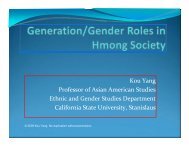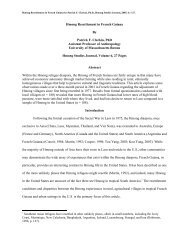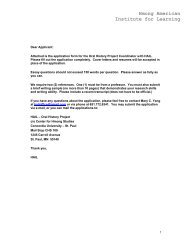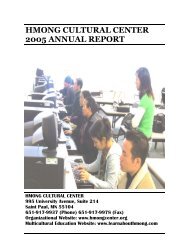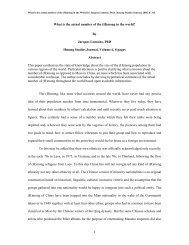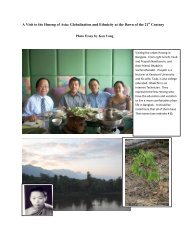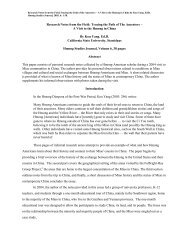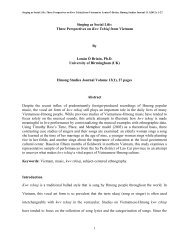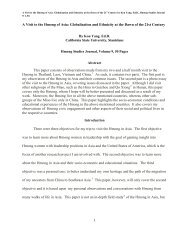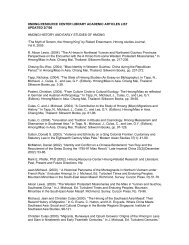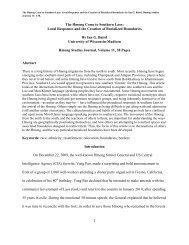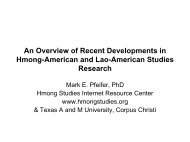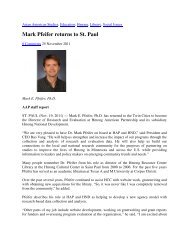Hmong and Lao Refugee Women - Hmong Studies Internet ...
Hmong and Lao Refugee Women - Hmong Studies Internet ...
Hmong and Lao Refugee Women - Hmong Studies Internet ...
Create successful ePaper yourself
Turn your PDF publications into a flip-book with our unique Google optimized e-Paper software.
<strong>Hmong</strong> <strong>and</strong> <strong>Lao</strong> <strong>Refugee</strong> <strong>Women</strong>: Reflections of a <strong>Hmong</strong>-American Woman Anthropologist by Dia Cha, Ph.D. <strong>Hmong</strong> <strong>Studies</strong> Journal,<br />
2005, 6: 1-35.<br />
<strong>Hmong</strong> language. An unmarried adult <strong>Hmong</strong> woman is a rarity, <strong>and</strong> this, coupled with the fact that it is<br />
a characteristic of the <strong>Hmong</strong> language that personal pronouns in matters of address are largely geared to<br />
kin relationships, created something of a problem. During initial meetings with the author, interviewees<br />
tended largely to assume the existence of a spouse, <strong>and</strong> the first question asked by all was the name of this<br />
spouse. This is not considered intrusive in <strong>Hmong</strong> tradition; rather, it is a sincere effort to establish the<br />
nature of the form of address which is to be employed in future conversations. Nevertheless, inasmuch as<br />
the author was unmarried, this tradition made for an awkward moment at the beginning of nearly every<br />
interview.<br />
Another gender-based difficulty faced by the author was more significant. This developed in<br />
March, 1992, when three refugee political leaders were removed from Chieng Kham camp due to<br />
involvement with resistance groups within <strong>Lao</strong>s. The male relatives of these men sought an explanation<br />
from officials both of the Thai MOI <strong>and</strong> from UNHCR <strong>and</strong> were given a specious rationale. Casting<br />
about for someone to blame, these relatives settled upon the author, believing her, so it seemed, a sort of<br />
"spy" or secret agent working on behalf of the <strong>Lao</strong> government. In an attempt to develop a course of<br />
action which might, so they hoped, rectify the wrong they believed had been done, the men approached a<br />
male relative of the author, also in camp at that time, to conduct an informal investigation. The relative,<br />
unable to answer all questions put to him, entered into an agreement to gather more information. Thus it<br />
was that the author was requested to write out a list of all sources of funding, together with a list of those<br />
organizations which had sponsored her research. Although this subterfuge on the part of the resistance<br />
leaders' relatives was not quite on the level of a James Bond film, it was considerably less than direct;<br />
however, requests addressed to these resistance leaders' family members made by the aforementioned,<br />
sorely tried relative of the author to the effect that they should make their inquiries personally met with no<br />
response, <strong>and</strong>, in any case, the amateur sleuths soon ceased their investigations. In this fashion, it all<br />
ended in a more or less harmless manner; however, one was left to ponder what might have happened had<br />
the author's male relative not been present in camp.<br />
22



